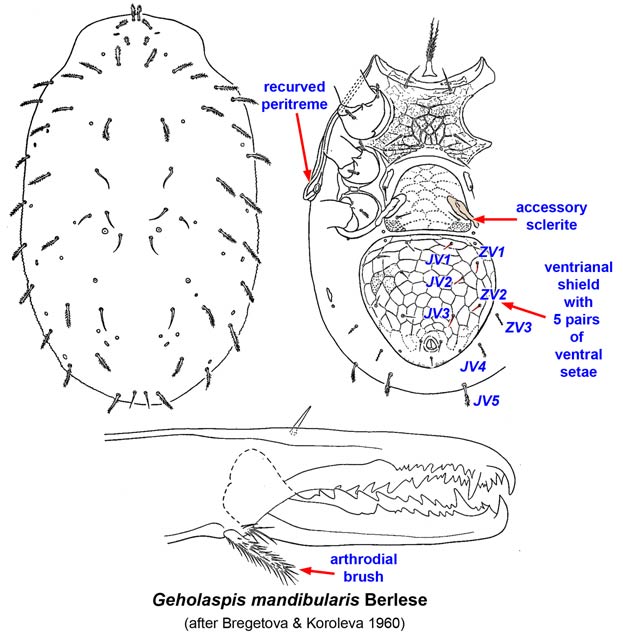Taxonomic Position
Cohort Gamasina
Subcohort Dermanyssiae
Superfamily Eviphidoidea
Family: Macrochelidae Vitzthum
Geholaspis Berlese
Diagnostic characters:
-
Free-living macrochelid mites with large, raptorial chelicerae
-
Arthrodial brush well developed
-
Ventrianal shields with 5 pairs of ventral setae plus the three circumanal setae.

Similar taxa. Most macrochelids have ventrianal shields with 3 pairs of ventral setae, rarely 4 pairs (Holostaspella) or only an anal shield (Neopodocinum), only Geholaspis has 5 pairs.
Key to Adult Females of Some Australian Genera of Macrochelidae
Key to Adult Females of Some Common Genera of Macrochelidae
1. With ventrianal shield bearing 9-13 setae...................................................................2
- With anal shield bearing 3 circumanal setae.........................................Neopodocinum
2. Vertical setae (j1) sessile on anterior dorsal shield..................................................... 3
- Vertical setae (j1) on prow-like projection............................................ Holostaspella
3. Ventrianal shield with 3 pairs ventral setae (+3 circumanals)............................................... 4
- Ventrianal shield with 5 pairs of setae (+3 circumanals).................................................. Geholaspis
4. Sternal shield with raised polygonal ornamentation & enclosing most of genital shield Glyptholaspis
- Sternal shield variously ornamented, but without strongly raised reticulate ornamentation and not strongly enclosing genital shield................................................................................................... Macrocheles
Diagnosis. Yellow to dark brown dermanyssine mesostigmatans with holodorsal shields. Peritremes generally well developed and reflexed near stigma. Sternal shield often extending to either side of genital shield and bearing 3 pairs of setae (st1-3) and 2 pairs of lyrifissures; metasternal shields present, bearing st4 and stp3; genital shield usually mound-shaped to subrectangular, and bearing 1 pair of setae; ventrianal shield narrow to broad with several pairs of ventral setae and 3 circumanal setae. Tarsus I without claws; trochanter I with 5 setae; tibia I with 5/3 dorsal/ ventral setae, genu I with 5/2; genu IV with 6-7 setae, 4/1 dorsal/ ventral. Chelicerae chelate-dentate; movable digit without excrescences, but with well developed arthrodial brush. Palp genu with 6 setae, palp apotele 3-tined; corniculi horn-like. Tritosternum biflagellate with columnar base. Tectum with long median tine and often with lateral flag-like processes. Female sperm induction pores near bases of coxae IV. Males with genital opening at base of tritosternum in sternogenital shield; spermatodactyl usually well developed.
References
Adis, J. & G. Krantz. 1985. Notes on the natural history of Macrocheles (Acari: Gamasida: Macrochelidae) associated with 3-toed sloths Bradypus spp. (Edentata: Bradypodidae) in the central Amazon. Zoologische Anzeiger 214: 222–224.
Evans, G. O. and Browning, E. 1956. British mites of the subfamily Macrochelinae Trägårdh (Gamasina – Macrochelidae). Bulletin of the British Museum (Natural History), Zoology 4 : 4-55 + Plates I-IV.
Evans, G. O. and Hyatt, K. H. 1963. Mites of the genus Macrocheles Latr. (Mesostigmata) associated with coprid beetles in the collections of the British Museum (Natural History). Bulletin of the British Museum (Natural History), Zoology 9 : 327-401.
Halliday RB. 1986. Mites of the genus Glyptholaspis Filipponi and Pegazzano (Acarina : Macrochelidae) in Australia. Journal of the Australian Entomological Society 25: 71-74.
Halliday RB. 1986. Mites of the Macrocheles glaber group in Australia (Acarina : Macrochelidae). Australian Journal of Zoology 34: 733-752.
Halliday RB & Holm E. 1985. Experimental taxonomy of Australian mites in the Macrocheles glaber group (Acarina : Macrochelidae). Experimental and Applied Acarology 1: 277-286.
Halliday RB. 1988. The genus Holostaspella Berlese (Acarina : Macrochelidae) in Australia. Journal of the Australian Entomological Society 27: 149-155.
Halliday RB. 1990. Mites of the Macrocheles muscaedomesticae group in Australia (Acarina : Macrochelidae). Invertebrate Taxonomy 3: 407-430.
Halliday RB. 2000. The Australian species of Macrocheles (Acarina: Macrochelidae). Invertebrate Taxonomy 14: 273-326.
Kinn, D.N. & J.J. Witcosky. 1977. The life cycle and behaviour of Macrocheles boudreauxi Krantz. Z. ang. Ent. 84: 136–144.
Krantz, G.W. 1983. Mites as biological control agents of dung-breeding flies, with special reference to the Macrochelidae, in Biological Control of Pests by Mites, eds M.A. Hoy, G.L. Cunningham & L. Knutson. Berkeley, University of California Agriculture Experiment Station Special Publication 3304: 91–98.
Krantz, G.W. & J.G. Wernz. 1979. Sperm transfer in Glyptholaspis americana, in Recent Advances in Acarology, vol. 2, pp. 441–446, ed J.G. Rodriguez. Academic Press: New York.
Walter, D.E. 1988. Macrocheles schaeferi (Acari: Mesostigmata: Macrochelidae), a new species in the subbadius group from grassland soils in the central United States. Annals of the Entomological Society of America 81: 386–394.
Walter, D.E. and Krantz, G.W. 1986. A review of the glaber group (s. str.) species of the genus Macrocheles (Acari: Macrochelidae) and designation of species complexes. Acarologia 27: 277-294.
Walter, D.E. and Krantz, G.W. 1986. Description of the Macrocheles kraepelini species complex (Acari: Macrochelidae) with two new species. Canadian Journal of Zoology 64: 212-217.